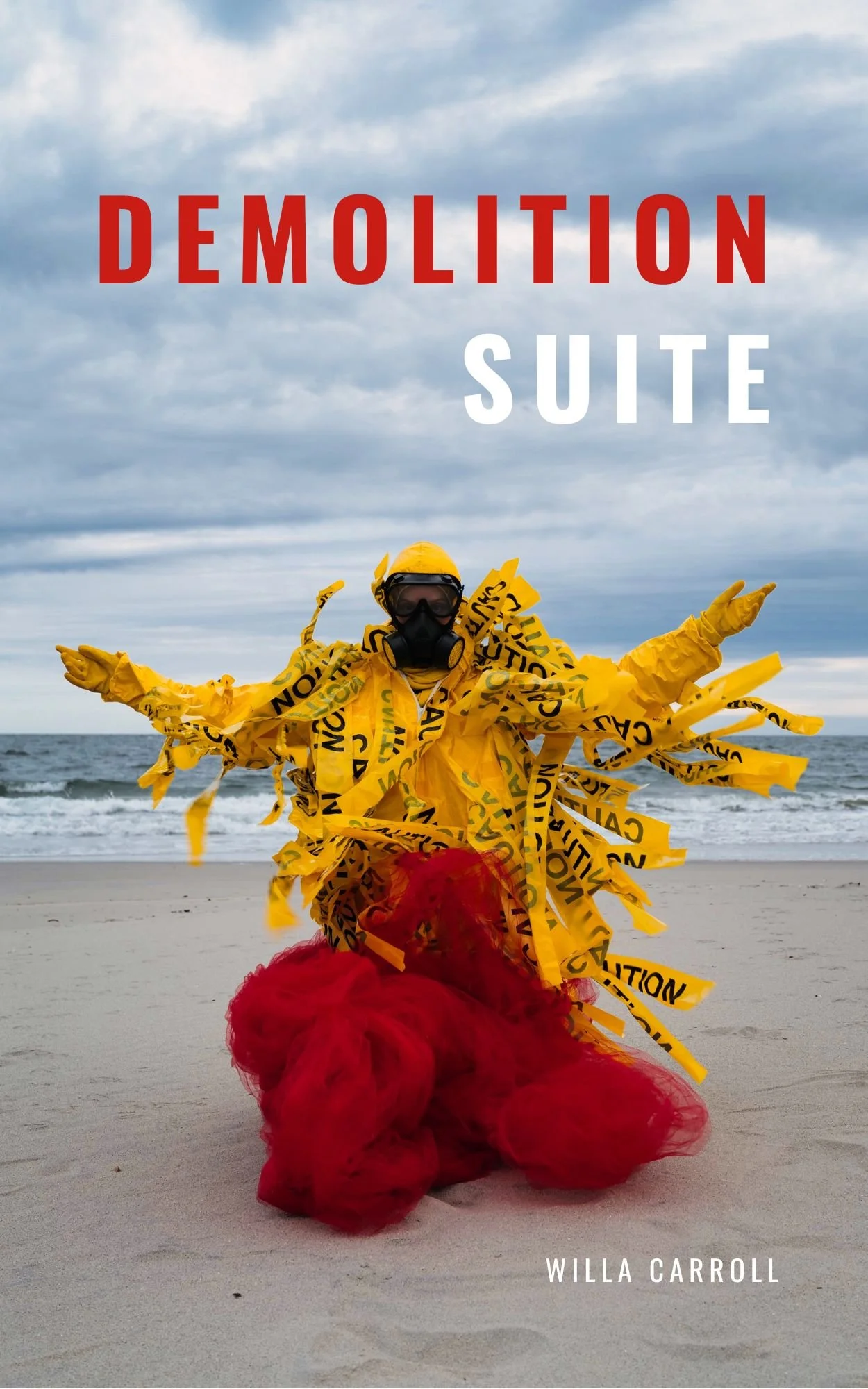These nimble poems grapple with what it means to belong to a body, a family, a country. With rigor and dark wit, Carroll conjures the exhilarating terror of moving through one’s life with nothing but “flesh holding / back disaster.”
––Tracy K. Smith
Here is a miraculous poet made of music. She writes what the world needs to hear—what I needed to hear. She takes on our greatest mysteries and inheritances: love, desire, loss, family, activism, art, justice— and every poem changes the air we breathe. This debut reworks the mind as it breaks the heart with its beauty. To be fully alive, in the face of devastation, grief, and longing, a poet must make a song that could be eternal. Willa Carroll is fearless in the face of that challenge. Her music deserves to be sung everywhere—in the church of our earth, in the peace between lovers, in the halls of our learning, in the quiet places of illness and death and mourning. Hers is an art of perpetuity, and she is a genius whose words I hold my breath to hear more clearly.
––Brenda Shaughnessy
As we speak or sing, the tongue dances in a hot wet auditorium momentarily lit. Half public, half private, this book maps the body in lingual movements that accrete and erupt out of stasis, striking choral resonances, transmuting personal/local histories, straddling the elegant and the repugnant. Here is a force to be reckoned with, a memorable debut.
––Timothy Liu
FINALIST FOR THE GEORGIA POETRY PRIZE
SMALL PRESS DISTRIBUTION BESTSELLER
Willa Carroll was an experimental dancer and actor before turning to poetry, and many of the poems of her remarkable debut collection, Nerve Chorus, revolve around performance and the body. Her work reminds us that much of our experience transcends our verbal abilities. With personal subject matter and elegant, yet accessible, philosophical explorations, Carroll succeeds in maintaining a strong tonal unity and distinct lyricism. Like experimental dance, these poems invite a visceral experience. Meanwhile, they should be admired for their lyrical flexibility, the exactness of their imagery, their life-affirming quality, as well as their intellectual engagement. Though this is her first collection, Carroll’s poems have garnered attention for some time. She won Tupelo Quarterly’s TQ7 Prize for her poem “Chorus of Omissions,” and her piece “No Final Curtain” won First Place in Narrative Magazine’s Third Annual Poetry Contest.
It is a cleansing—a heartbreaking—exercise to try to unsee the seen and undo the done. In “Chorus of Excisions,” Carroll works with clean imperative strokes, revealing the outline of what is desired by paring away the great botch of our greedy endeavors. “Requiem for a Millennium,” meanwhile, conjures the movements of a Butoh dance, reading in them vivid associations of destruction and possible hopes of redemption.
Several times, breathtaking music and wordplay allow both poet and reader to enter additional narratives related to other layers of violence and power, such as our national Me, Too movement, or shootings that leave us grappling with the sudden disappearance of friends and acquaintances. . . . This is one of the bravest collections of poetry I’ve come across, and its themes connecting back to power and the body make it an important read for our time.
The charged lyrics and sonic acrobatics of Carroll’s mesmerizing Demolition Suite grieve and celebrate, haunt and excite. How can anyone read these thrilling, sonorous poems and remain unmoved? Here, we are witness to the vast, capacious body. Carroll is a nimble poet who transforms us with the force of her wondrous and devastating lines. This riveting collection proves a vital addition to our conversation around urgent ecological concerns. Call these poems a warning. Call them a prophecy. Demolition Suite compels us to sing its fierce hymns.
––Albert Abonado, author of JAW
Intensely lyrical, emotionally expansive, and intellectually epigrammatic, Carroll tackles the science of the body, the body politic, and climate crisis with controlled abandon. This is a lexical call-to-arms like a “father’s hammer [that] | craters the walls” around you. Get ready to “Rattle the chain of custody” between her interior and exterior sensory realms. “I’m not your biddable animal,” she declares, placing her “ear to the wall | of your chest | for the flesh drum” to hear the orchestral scores for the millennium’s self-destruction. Rich, inventive, and wholly compelling, this “exit music” makes for a terrible beauty––I’m still savoring “all the sweet debris | every last bird” this powerful book has to offer.
––Elena Karina Byrne, author of If This Makes You Nervous
Demolition Suite gives us the music; the movement; the body; the sexual body; the body compromised; the body demolished; the land, the water, compromised or demolished; the father, gone. It’s not difficult to see the connections, thanks to Carroll’s skillful, surprising use of structure, wit, and inventive, precise language. Brava on this stunning collection.
––Estha Weiner, author of at the last minute
FINALIST FOR THE TOMAŽ ŠALAMUN PRIZE
SELECTED FOR THE SPLIT ROCK PRESS POETRY CHAPBOOK SERIES
Demolition Suite spins a cautionary tale for the Anthropocene. This innovative sequence engages climate change, environmental degradation, and hazardous exposure with unexpected poetics. From contaminated sites to troubled bodies of water, forest fires to rewilding zones, these poems cover wide ground. Fluid tones shift between grief, wit, intimacy, and beyond. With kinetic diction, these pages stage embodied responses to our imperiled planet. Out of crisis, Carroll forges strange radiance, envisioning ecological restoration.

